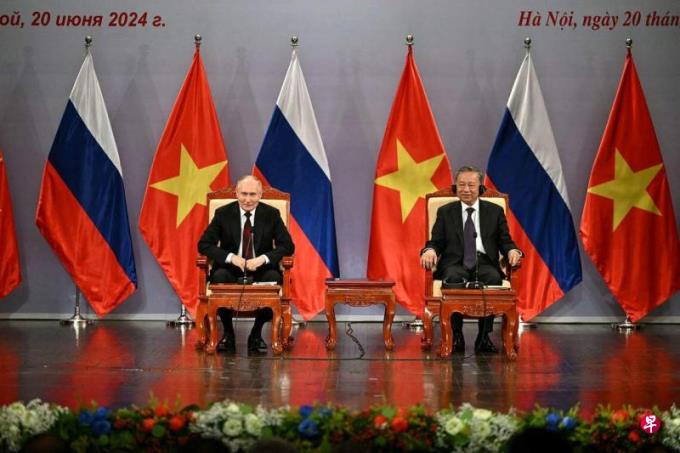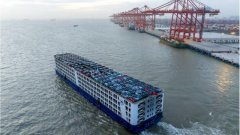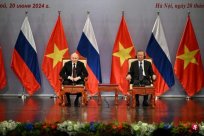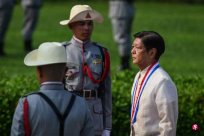
The invitation of the General Secretary of the Central Committee of the Communist Party of China Ruan Fuzhong, Russian President Putin made a formal visit to Vietnam on June 19.Vietnam had previously absent from the Ukraine Summit, which caused the international community to criticize it.Although in recent years, compared with China and Russia, the interaction between Vietnam and the Western camp has been different, but if the outside world feels that Vietnam will move closer to the West, it will still not know enough about Vietnam's foreign policy.
On the surface, Vietnam and Russia have quite good economic and trade and technical exchanges. The two countries have historical origins, and even Russians are particularly keen to travel to warm Vietnam.However, the reason why Vietnam really accepts the almost betrayal Putin should also find answers from the diplomatic tradition.
In terms of institutional design, the Vietnamese Ministry of Foreign Affairs has not only been single, or even the most important foreign decision -making agency for a long time.Like the Central Committee of the Communist Party of China, it has been a decision maker behind the scenes for a long time, and is restricted by the Vietnamese Defense and Security Council.The chairman of this committee is the President of Vietnam and the vice chairman as the Prime Minister.The other four members include the chairman of Congress, National Defense, Public Security, and Foreign Minister, so they determine important national policy of Vietnam, as well as the trend of foreign policy.
In terms of tradition, since the establishment of the Vietnamese Democratic Republic in 1945, Vietnamese father, which has a deep connection with the mainland government, and Ho Chi Minh, who also serves as the Foreign Minister, has adopted a practical policy on the diplomatic line.Regardless of the French or the Chinese government (at the time with the Civil War with the Mainland Government), he held a balanced and friendly attitude.Only in 1950, with the establishment of formal diplomatic relations with the Soviet Union, China and Vietnam, Vietnam completely joined the socialist camp.Affected by ideology at this time, Vietnam not only fascinated with China, the Soviet Union and other alliances, but also economically.Until the end of the Soviet Union's collapse, the Soviet Union still accounted for about 40 % of Vietnam's import and export trade.
Vietnam also decided to promote economic innovation cause in China in 1986, which attracted foreign capital from non -socialist countries.With the fall of the Su Dong Group and China's reform and opening up, it has deepened, and correspondingly, Vietnam's foreign policy has also been adjusted, and the relationship between the surrounding countries, especially the Asianan countries, is normalized to serve the economic innovation movement.In order to seek "more friends, less tree enemies."By 1988, the Vietnam Communist Politburo issued a new situation in foreign tasks and policy resolutions, emphasizing the need to achieve "multi -party foreign policy", which laid the foundation for the three or forty years of foreign decisions.
In 1991, Vietnam signed a peace agreement with 18 countries in Paris, solving the Cambodian issue, and the normalization of diplomatic relations with China in the same year.1995 was one of the most important years in the history of Vietnam's diplomacy. It realized the normalization of relations with the United States. It signed a framework of Vietnam -European Community Cooperation with Europe and joined the founding of Asia.Organization.Two years later, Vietnam joined the Asia -Pacific Economic Organization (APEC), which marked Vietnam's comprehensive return to international families.
However, Vietnam's foreign policy still has two main axes. The first is determined by the characteristics of the regime.Maintaining the interests of the party is still important or even the most important consideration for Vietnam's foreign decision -making. This has a potential impact on the diplomatic relations between Vietnam and the United States and the United States; secondly, Vietnam's own deep -rooted nationalism.Vietnam is a national country with confidence in thousands of years of cultural traditions, and has a strong sense of cultural pride.In 2003, in the decision of the Nine CPC Central Committee of the Vietnam, it was clearly mentioned that foreign decisions were to establish partnerships with all friendly countries, but "conspiracy and actors who played with Singapore's national independence and socialist goals are all 'Object '".
By 2011, the Eleven Congress of Vietnam wrote the "national interests" into a political report for the first time.The national interests here are the duality of political parties and nation -states.Therefore, although Vietnam has achieved comprehensive openness in many aspects of politics, culture, science and technology, education in recent years, and achieved remarkable achievements, but due to the existence of these two diplomatic axis, the weighing of the party's interests determines the between Vietnam and the West.There is always a potential thunder area; and nationalism makes the appearance of Vietnam and the "northern country" with territorial disputes.
Therefore, we can find that Vietnam's diplomacy is mostly hoping to strengthen relying on Asia to achieve strategic depth and economic support.In 2019, Vietnam established the "Vietnam and the Asian Security Commission". At the establishment ceremony, then Prime Minister Ruan Chunfu emphasized that Vietnam always regarded Asianian as the cornerstone of its diversified diplomacy and placed the best priority.At the same time, Vietnam will obtain economic and technological development through cooperation with Western countries such as the United States; to maintain economic growth and stabilize the Communist regime through economic and political cooperation with China;Japan, India, and other regional cooperative relations are established to check and balance China.
In Vietnam's diplomatic relations level, only Russia, China and India are the most preferred "comprehensive strategic partnership", and the United States has always been the "comprehensive partnership relationship" of the third level;During the time when you were on the state visit to Hanoi, the relationship between the two countries was comprehensively promoted to the first level.But obviously, in the relationship between the two, Vietnam believes that the United States needs Vietnam, which is more active than Vietnam needs the United States.Therefore, there should be too much doubt about the West to visit Putin.Vietnam uses contradictions and containment among different countries to achieve the strategy of survival in the gaps.This is called "bamboo diplomacy" by Vietnamese diplomatic community, that is, the use of multi -directional checks and balances to achieve the diplomatic purpose of the bamboo clumps, but it can reach the cloud.
The author is a local literary and historical enthusiast and religious researcher




